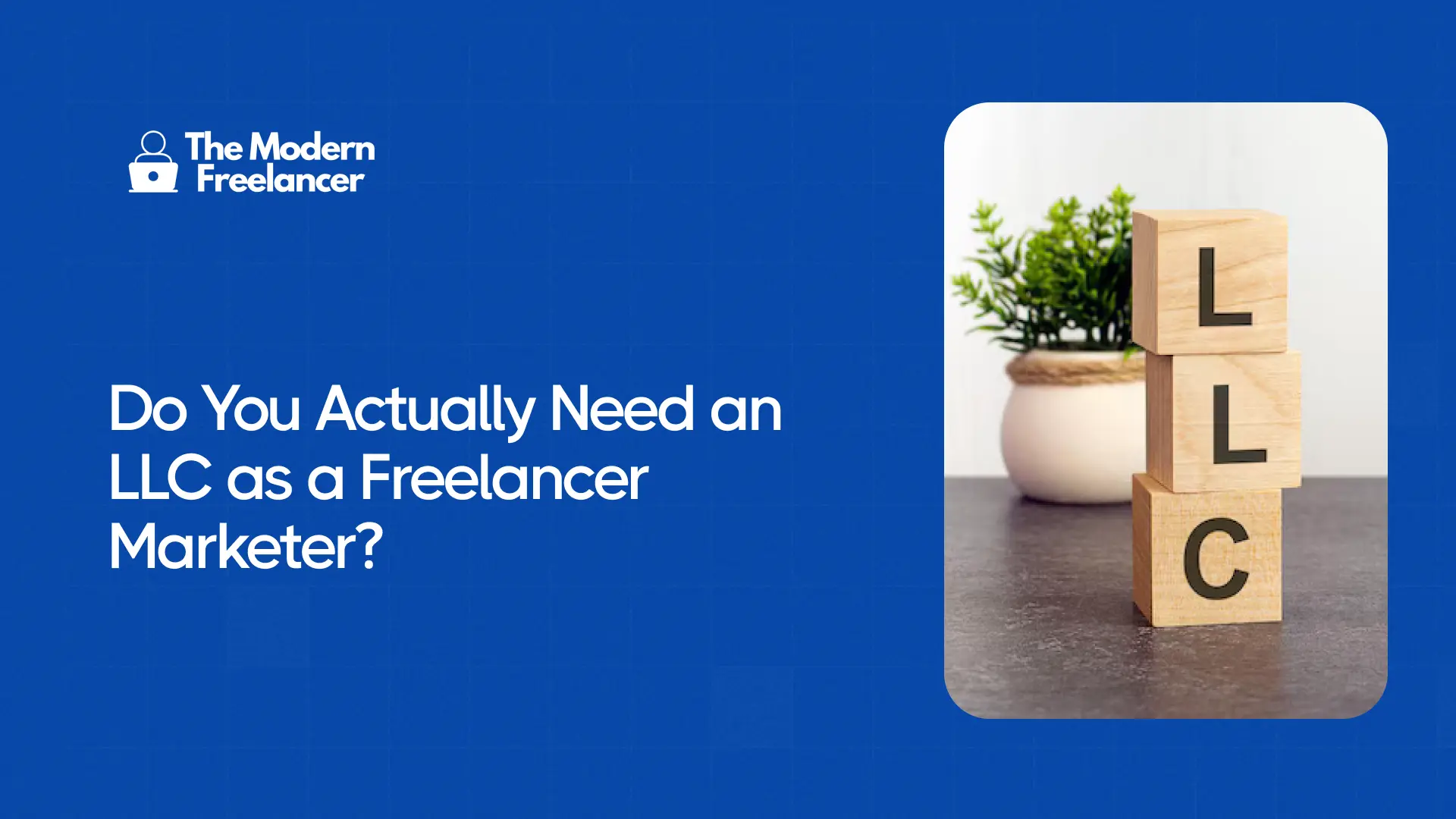Do You Actually Need an LLC as a Freelancer Marketer in 2026?
Understanding your legal options as a Freelancer. Sole Proprietorship vs LLC vs S Corp

Heads up: Some of the links below are affiliate links, which means I may earn a small commission if you choose to use them — at no extra cost to you. I only recommend tools I personally use and trust.
It's almost 2026 - time for year-end business planning and tax prep.
One question I get constantly: "Do I need an LLC to freelance?"
My answer might surprise you: You have three options, and the "right" one depends entirely on your revenue and situation.
Here's how to choose the business structure that actually makes sense for where you are right now.
The 3 Business Structure Options for Freelancers
Option 1: Sole Proprietorship (The Default)
What it is: You ARE the business. No separate legal entity, no paperwork.
Pros:
- Simple - you can start freelancing today
- No state fees or compliance requirements
- File taxes on your personal return (Schedule C)
Cons:
- Zero liability protection (your personal assets are at risk)
- Higher self-employment taxes (15.3% on all profit)
- Less professional credibility with bigger clients
Best for: Freelancers just starting out, under $30K revenue, low-risk work like content writing or social media management.
Option 2: LLC (The Popular Choice)
What it is: Limited Liability Company - a separate legal entity that protects your personal assets.
Pros:
- Liability protection (your house isn't at risk if you get sued)
- Professional credibility (bigger clients often require it)
- Tax flexibility (can elect different tax treatments)
- Easier to open business bank accounts
Cons:
- State filing fees ($50-$500 depending on state)
- Annual compliance requirements
- More paperwork and record-keeping
Best for: freelancers with $30K-$75K revenue, working with bigger clients, handling sensitive data, want asset protection and tax write-offs.
Option 3: S-Corp Election (The Tax Saver)
What it is: An LLC that elects S-Corporation tax status - gives you maximum tax benefits.
This is where things get complex, but the tax savings are massive. If you're making $75K+ and want to optimize this properly, Collective.com handles all the S-Corp setup and ongoing compliance so you don't have to become a tax expert.
Pros:
- Massive self-employment tax savings (only pay on salary portion, not distributions)
- Maximum liability protection
- Professional credibility
- Can save $5K-$15K+ annually in taxes
Cons:
- Most complex option
- Requires payroll (you must pay yourself a salary)
- Additional accounting and compliance costs
- IRS scrutiny on salary vs. distribution split
Best for: Full-time freelancers with $75K+ revenue, want maximum tax optimization, can handle the complexity.
The Real Numbers: Tax Comparison
Let's say you make $100K profit (using 2024 federal tax rates for a single filer):
Sole Proprietorship:
- Self-employment tax: $15,300 (15.3% on $100K)
- Income tax: ~$22,000 (22% bracket after standard deduction)
- Total: ~$37,300
LLC (default tax treatment):
- Same as sole proprietorship: ~$37,300
S-Corp Election:
- Pay yourself $60K salary (reasonable salary requirement)
- Self-employment tax on salary: $9,180 (15.3% on $60K)
- Income tax: ~$22,000 (same as above)
- Total: ~$31,180
- Savings: ~$6,120 annually
The S-Corp election can save you thousands, but only if your revenue justifies the additional complexity and costs.
When Each Option Makes Sense
Under $30K annually: Stay sole proprietor. Keep it simple and focus on growing revenue.
$30K-$75K annually: Consider an LLC. The liability protection and professional credibility are worth it, especially if you're working with bigger clients.
$75K+ annually: Seriously look at S-Corp election. The tax savings alone can pay for the additional accounting costs.
Also consider your risk level: If you're handling sensitive client data, working with big brands, or in a lawsuit-prone industry, get that LLC protection earlier.
The Old Freelancer Way vs. The Modern Freelancer Way
The old freelancer way:
- Form an LLC immediately because "you need to look professional"
- One-size-fits-all advice regardless of revenue
- Handle all the paperwork yourself
The modern freelancer way:
- Choose the right structure based on your actual situation
- Upgrade strategically when the numbers make sense
- Use professional services to handle compliance while you focus on clients
Your Action Step
This week:
- Calculate your annual freelance revenue
- Assess your risk level and client requirements
- If you're ready to upgrade: Check out Collective.com for professional help with LLC formation or S-Corp election
The goal isn't to have the "perfect" business structure from day one. The goal is to choose the right structure for where you are now, then upgrade when it makes financial sense.
--
Want more freelance marketing tips that actually work?
Subscribe to my newsletter and get actionable freelance marketing strategies delivered to your inbox weekly.



